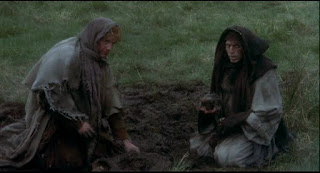Player 1: "This is nuts! My character has got twenty THOUSAND gold pieces here! That's like Bilbo at the end of the Hobbit! Why would I go off into the wilderness looking to get killed? I can live off room service for the rest of my life here in town!"
Player 2: "C'mon, man! We need a melee tank! If your fighter sits it out, then we're hosed. Besides, why come to game if your PC is gonna just sit in town?"
Player 1: "I'd have fun doing town stuff."
DM: "No offense, but I didn't prep a town adventure, and -"
Players 2-X: "We don't WANT to stay in town, we want the dungeon!"
DM: "CAN I FINISH??… Thank you. AND I'm not going to spend the evening bouncing back and forth between your shenanigans and the rest of the group."
Player 1: " 'Shenanigans'? What are you, eighty-two?"
DM: "Shut up and buy your trail rations."
Player 1: "Oh, all right! I was just saying…"
You know the type. The player whose character doesn't want to adventure. I'm not talking about the one that would rather go one way while the rest of the group wants to go the other, I mean they genuinely feel in-character that their PC wouldn't keep risking horrible death after a certain point. It's not that they are necessarily disruptive to a campaign, but it's a wrinkle GMs have to deal with from time to time.
It's a fair point, to a degree. Even mid level PCs can have amassed an impressive level of wealth compared to the typical peasant type. Let's face it, most turnip farmers have never even seen a platinum piece, let alone worrying about whether they can exchange all that bulky coin for gems or jewelry to reduce their encumbrance.
Consider that, in a game like B/X, your typical XP spread is about 80% treasure, 20% combat (kills). So by about 5th level, most PCs will have had over ten thousand gold pieces pass through their hands. That's enough to buy a ship, or a galley (albeit small ones). I imagine if a character got into the adventuring business for the profit, they'd probably be starting to wonder when to cash out before they cash in.
As a DM trying to sustain a campaign, there are a couple of ways you might approach this issue…
- Let it happen. If a player thinks his PC wants to retire, let him. There's no point in forcing someone to play a PC they don't want to play. If the other PCs try to convince him in-game to keep going, fine. That's called roleplaying, and the more the players do amongst themselves, then the less work for you! Of course, if the player wants to bring in another PC, there may be some back & forth about thing like starting level or wealth for the new PC, but if he ends up wimpier than the rest of the party, that's his choice.
- Wealth reduction. In other words "Screw the PCs out of their hard stolen loot!" Pickpockets, thieves, taxes, con games, crooked gambling houses, larcenous whores, the list goes on. One way to make a PC want/need to go treasure-hunting again is to TAKE AWAY HIS TREASURE. This can be effective, but too much of this kind of thing can feel like vindictiveness to the players. After all, they battled monsters, they disarmed traps, they slogged through swamps and caves to get that loot, and now some street urchin has just lifted a pouch holding 5,000gp in gems! Unfair! It will also lead to rampant paranoia while they are in town.
- Let the engine do the work. In this case, the 'engine' being the setting. This involves a bit of prep work, but even an existing campaign could have some of these ideas bolted on without a lot of fuss. The main thing is to make is consistent and impartial. This is an idea that I'm just developing a bit to see if it has legs, so bear with me.
I'm no medieval scholar, and I'm not striving for historical accuracy here, but I think it's fair to say that feudal/medieval life was fairly different than modern times. I'm not talking about things like science and technology, but the way things worked socially and economically. People today talk about the upper socioeconomic echelons of "the 1%", but back in the day, it was a lot less than 1% that could be considered wealthy. You had SCADS of people who were stultifyingly poor. I mean miserably so. The middle class hardly existed and the rich were ridiculously rich. The idea of rising through the ranks of society and "making your fortune" were pretty alien concepts for the time.
Now obviously you can't equate the economics of a D&D fantasy setting perfectly with feudal Europe, but certain truths can be taken into account with both.
- That societies are usually designed so that whomever is at the top stays there.
- Playing by the rules is not necessarily the best way to gain upward mobility (see point 1)
- Those who don't play by the rules had better win.
Now, a fantasy world where PCs can come into a middling size town and sell ancient jewelry, buy a full set of plate mail, and maybe even pay a cleric 1,000 gp for a Cure Disease spell just in case the thief did catch lycanthropy from that weird-looking wolf creature is not an economy where the "lower classes" have NO wealth. However, it doesn't necessarily follow that the jeweler can pay full value in hard coin, or that the armorer doesn't have to turn around and use most of that money for expenses, or that the local temple gets to keep that money. There's always a power structure taking its cut (sometimes more than one). Consider things like guild fees, church tithes, and –of course– taxes. At the end of the day, those townsfolk who took in all that wealth from the PCs might end up with relatively little of it.
Now PCs tend to be a transient lot, like Bruce Banner in the Hulk, they keep moving from one adventure to the next.
But, you know, with less of Liv Tyler in a wet shirt offering you a ride.
This means it's a little harder for them gosh-darn revenooerz to catch up and ask you for a 1040-DnD Form, but once you settle down and open a bar or something? Guess who's gonna come a-knocking? Next thing you know, that stack of gold ain't gonna pile up quite so high. Unlike a shopkeeper who is making a few gold here and there over the course of months and years, someone who literally just walks out of the wilderness with bags of cash and set themselves up in a town is likely to pay a premium for that privilege. Oh, sure, you can hide the loot or bribe officials, but even if you don't end up losing most of your nest egg, you're a lot less comfortable than you were. Like a lottery winner who gets a decent (but not humungous) jackpot and decides to quit their job, you can live off your windfall for the rest of your life, or you can live big, but you can't usually do both. And once you aren't idly well-off, you know what you've got? The adventurer's worst nightmare: WORKING FOR A LIVING!!
So what's an ex-adventurer wannabe to do? Simple: Beat them at their own game.
I don't mean get out your +2 longsword and gut the tax man. I mean, get so STINKING rich that –like in the Count of Monte Cristo– you can buy your way into the power structure and become insulated from the oppression. This is, in a sense, part of the theoretical "End Game" of D&D. The PCs begin to move within the constellations of power, gain titles, political power, and acceptance amongst the "haves." They may not invite you to tea, but they aren't going to push you around either. Whether you're an archmage in a tower, a church patriarch, a crime boss, or landed gentry, you've got a position that gives you leverage. Just climbing to middling only means you'll take a little while longer to fall back underneath.
You can go the other route as well, and strike out for the wilderness, staking your own claim. This is simply building a new power structure with you on top, and accomplishes much the same end. No one says you can't be benevolent, but at least you aren't relying on the kindness of strangers.
Next time a PC says "Hey, I got a little set aside. It's a lot more than most people have. Why should I keep risking my neck?" Maybe give him a little rope, he'll do the rest. The best part? It's not like the character died, or even lost levels. He can leave it all behind and get back in the saddle, ready for adventure again after his little trip down reality-lane.




There was a Dragon article that suggested reducing all treasures by a factor of 10. Players still get XP for the larger hoard, but a lot less actual cash. I also like the rules that say PCs pay for levelling up. Besides lottery winners, you might also think of pop musicians and atheletes as real-world "adventurers" trapped in a cycle of trying to live up to their own reputation.
ReplyDeleteI've always liked the idea of PCs having escalating costs of living, but in practice I find it heavy-handed. You'll always have the player who decides he doesn't care about appearances and stays in the seediest inns, hoarding his coin.
DeleteTraining/leveling costs are a good setting-based tweak, but can sometimes be tricky to keep from feeling artificial.
no, I'd don't mean escalating cost of living. I guess I mean tuition fees. which makes the most sense for magic-users. (what does 2,000 gp buy at 4th level fighter school?)
Deletebtw, I like your explanation as to why every temple wants to charge you for the healing miracles that they get to perform every day-- it's not that every last tucking friar is a greedy bastard, but that his superiors are. or his landlords.